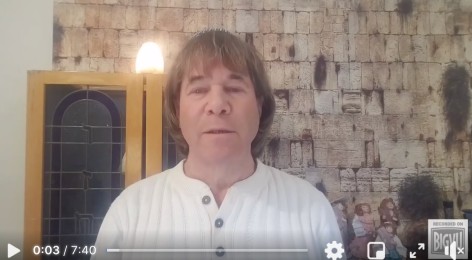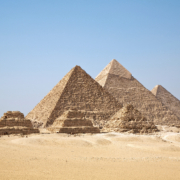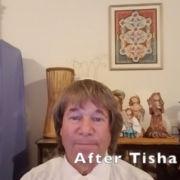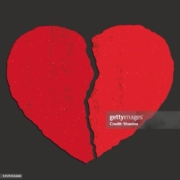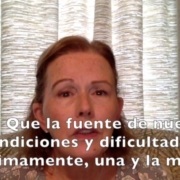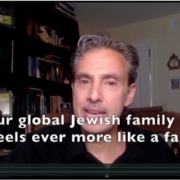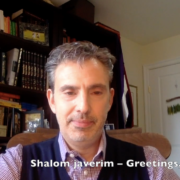Palabras del Torá / a “vort” of Torah from R’ Sunny Schnitzer
Bayit offers video “vorts” (words of Torah / teachings from Jewish tradition) offered in or translated into Spanish, designed for Cuban Jewish communities and available to Spanish-speaking Jews everywhere. This month’s offering features a teaching from Rabbi Sunny Schnitzer. The text follows the video link, in Spanish and then in English.
Shalom Mi hermanos y hermanas
Purim ha terminado y en unas semanas llegaremos a la Pesaj, también conocida como Zeman Cheiruteinu, la Temporada de nuestra Libertad.
Este año, nuestro Zeman Cheiruteinu adquiere un nuevo significado, ya que muchos de nosotros anhelamos ser libres de nuestro aislamiento. Tenemos la esperanza de que pronto los avances médicos nos permitan estar juntos nuevamente con nuestros seres queridos y nuestra amada comunidad. Nos moveremos de nuestro Mitzrayim, la palabra en hebreo para Egipto que literalmente se puede traducir como “los lugares estrechos”.
¿Cómo pasamos de lo estrecho a lo ancho del corazón?
Nuestra tradición judía nos proporciona un ritual para lograr este cambio. Bajo la luna llena de principios de primavera, compartimos una historia atemporal. Los místicos judíos nos enseñan que la declaración; “B’chol Dor Vador – en cada generación es como si nosotros también fuéramos esclavos en Egipto, es una invitación a contar la historia de nuestras vidas y, a través de la narración, a ganar nuestra propia libertad.
Volver a contar nuestra historia en el contexto de la historia bíblica de la liberación del pueblo judío nos permite recuperar las partes de nosotros mismos que se han perdido o esclavizado. En la imagen gráfica de un místico, “Todo el año Dios camina detrás de nosotros y recoge las piezas de nuestras vidas que hemos dejado atrás”. Este año estamos llamados a reflexionar sobre las piezas de nosotros que hemos dejado atrás y cómo podríamos recuperarlas.
Esto no es tan fácil como simplemente leer las palabras de la Hagaddah de la Pascua. Debemos profundizar para escuchar nuestra historia real y reconocer que nuestras historias reales no siempre son bonitas. Y eso está bien.
Pesaj es el momento en que podemos liberarnos de nuestro propio deseo de editar y falsificar nuestras historias personales.
En la apertura de nuestro seder de pesaj se parte una matzá por la mitad y comenzamos una carrera para contar nuestra historia antes de la llegada del amanecer. Revivimos venir a través de la oscuridad de las dos últimas plagas sobre Egipto.
Cuando termina la oscuridad, comenzamos nuestro viaje hacia un nuevo lugar, un lugar que no habíamos conocido antes. Durante la noche buscaremos lo que se ha roto, el Afikoman. Debemos encontrar esta parte rota que se nos ha ocultado antes de que podamos terminar nuestro seder Esto es lo que debemos encontrar, la parte de nuestra historia que quizás preferiríamos no mirar, la parte que no queremos que nadie vea, especialmente a nosotros mismos.
A medida que descendemos a nuestra narrativa vespertina, mientras escuchamos las historias de opresión y emancipación, enviamos a los niños a encontrar aquello que ha sido roto y oculto.
Y cuando lo encuentran, se lo devuelven al adulto. Este es el niño que hay en nosotros devolviendo nuestra pieza rota al adulto que hay en nosotros. Y quizás lo más importante, cuando eso sucede, el niño que encuentra lo que ha estado oculto recibe un premio.
Nuestra historia de liberación no es solo personal, sino también comunitaria. Este año, sabemos tan bien como nadie ha conocido nunca cómo el aislamiento invernal conduce al descontento y a la formación de, un kotzer ruach, el espíritu impaciente que atormentó a los israelitas en su viaje.Como nuestros antepasados, realmente sabemos lo que es esperar el ángel de la muerte para pasar y, con suerte, perdonarnos a nosotros y a nuestros seres queridos.
Pesaj es una poderosa metáfora de lo que hemos aprendido en este año tan inusual. El seder, más que nunca, tiene el poder de unirnos a todos en una experiencia compartida, incluso cuando no estemos en un solo lugar. Sirve para recordarnos que la liberación y la libertad real ocurren cuando actuamos como una comunidad a pesar de los desafíos de nuestra separación.
Este año recuperemos nuestra historia, preparémonos para movernos de donde debemos estar ahora a donde podemos estar en el futuro.
Feliz Pesach mi Amigos!
Purim has ended and in a few weeks we will reach Passover, Pesach, also known as Zeman Cheiruteinu, the Season of our Freedom. Jews have always yearned for liberty.
This year our Zeman Cheiruteinu takes on new meaning as so many of us yearn to be free of our isolation. We have hope that soon medical advances will allow us to be together again with lur loved ones and our beloved community We will move from our Mitzrayim, the word in Hebrew for Egypt which literally can be translated as “the narrow places.”
As King David says in Psalm 118; “I call out from the narrow places – answer me please with the expanses,”
How do we pass over from the narrow to the wide places of the heart?
Our Jewish tradition provides us with a ritual to accomplish this shift. Under the full moon of early spring, with our loved ones, our friends, and also with strangers in our midst, we share a timeless story. The Jewish mystics remind us that “B’chol Dor Vador – in every generation it is as if we too were slaves in Egypt, is an invitation to tell the story of our lives and through the telling to gain our own freedom.
Retelling our story in the context of the biblical story of the liberation of the Jewish people allows us to reclaim the parts of ourselves that have been lost or enslaved. In the graphic imagery of one mystic, “All year God walks behind us and collects the pieces of our lives that we have left behind.” This year we are called to reflect on the pieces of ourselves we have left behind and how we might reclaim them.
This is not as easy as simply reading the words of the Passover Hagaddah. We must dig deep to hear our true story and acknowledge that our true stories are not always pretty. And that is okay. For when we sanitize our life stories we risk turning beautiful lives, imperfect and flawed though they may be, into failures. Wishing to avoid the glare of our lives in the blinding light of truth, we begin to edit, forget, to push whole parts of ourselves into shadow and darkness.
Pesach is the time when we can free ourselves from our own desire to edit out and falsify our personal stories.
At the opening of our pesach seder a matzah is broken in half. As if crunch of the breaking cracker were a starting gun, and we begin a race to tell the story before the coming of the dawn. We relive coming through darkness, known in our Haggadah as the Watchnight of the Eternal. When the darkness ends we begin our journey to a new place, A place we have not known before. During the night we will search for what has been broken, the Afikoman. We must find this broken part which has been hidden from us before we can finish our ritual. This is what we must find, the part of our story that we might prefer not to look at, the part we don’t want anyone to see, especially ourselves.
As we descend into our evening narrative, as we hear the stories of oppression and emancipation, we send the children off to find that which has been broken and hidden.
Those children that we send are part of ourselves, returning to that moment when the world seemed so broken that we began to hide; that moment when our wholeness was shattered and the unseemly was hidden away.
The children go searching for that moment in the hidden parts of the homes we have created for ourselves and our families. And when they find it, they return it to the adult. This is the child in us bringing our broken piece back to the adult in us. And perhaps most importantly, when that happens the child who finds that which has been hidden gets a prize.
Our story of liberation is not only personal, but it is also communal. This year, we know as well as anyone has ever known how winter isolation leads to discontent and the formation of, a kotzer ruach, the impatient spirit which plagued the Israelites on their journey. It is a time of short days and much darkness. Like our ancestors we truly know what it is to hunker down in our homes and wait for the angel of death to pass over and hopefully spare us and our loved ones.
Pesach is a powerful metaphor for what we have learned in this most unusual year. The seder, more than ever, has the power to bring all of us together in a shared experience, even when we are not in one location. It serves to remind us that liberation and real freedom happen when act as one community despite the challenges of our separation,
This year let us reclaim our story, let us prepare to move from where we must be now to where we can be in the future. Let’s go to the promised land.

By Rabbi Sunny Schnitzer.

